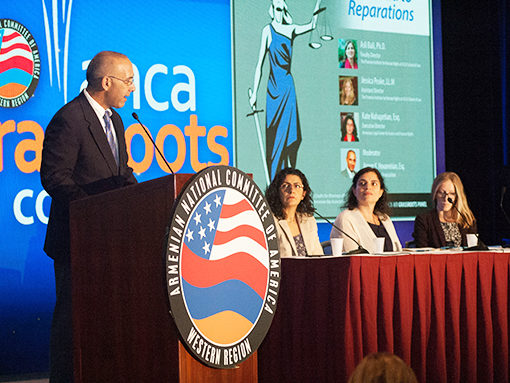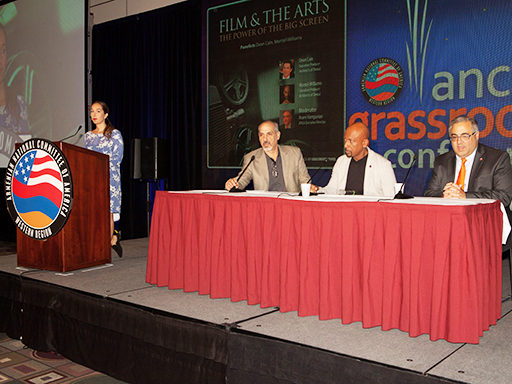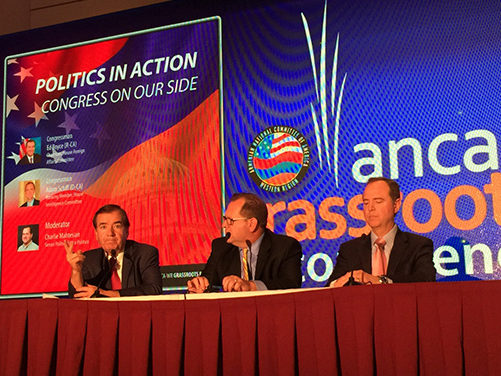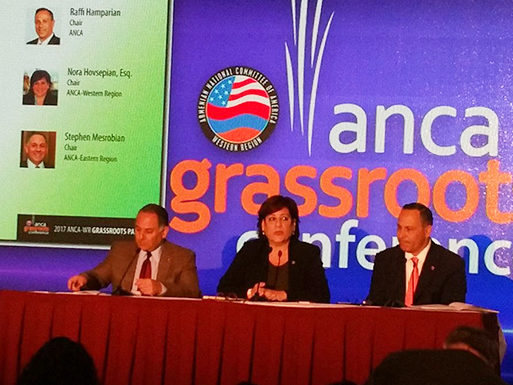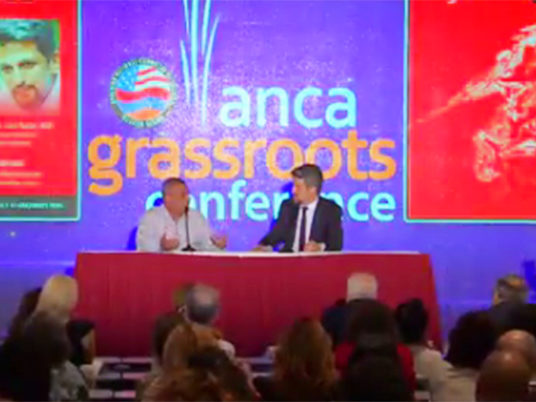ANCA-WR Grassroots Conference Elevates Activism in the Community
October 16, 2017PASADENA, Calif.—Hundreds of community leaders and members, scholars and activists gathered at the Pasadena Convention Center on October 6 and 7 for the 4th Armenian National Committee of America – Western Region Grassroots Conference to hear experts in law, politics, media discuss modes of advocacy in the active pursuit of the Armenian Cause.
The conference kicked off on Friday evening with an exclusive screening of the much-anticipated documentary “Architects of Denial” followed by a welcoming reception of the two-day conference that continued on Saturday, October 7 at the same location.
ANCA-WR Chair Nora Hovsepian welcomed the attendees and introduced the evening’s film as an unprecedented presentation linking the Armenian Genocide in Turkey one hundred years ago with more recent attacks on Armenians by Azerbaijan. The film was also featured in a panel discussion on the following day.
The five panels on Saturday became an interwoven narrative of the fundamentals of Hye Tahd and have audience members the opportunity to interact with panelists through question and answer sessions following their presentations.
The “ANCA On the Move: The Power of Grassroots” panel was presented by ANCA National Board Chair Raffi Hamparian, ANCA Western Region Chair Nora Hovsepian Esq., and ANCA Eastern Region Chair Stephen Mesrobian. Hovsepian opened the panel discussion by discussing the four essential prongs to the Armenian Cause: Armenian Genocide recognition, reparations, and justice; generating foreign aid and assistance to Armenia in advancing democracy and economic development; supporting the people of Artsakh in their quest for self determination and independence; and Diaspora community development on a local level.
Hamparian continued the discussion by identifying the three hallmarks of the ANCA. Hamparian highlighted the significance of volunteerism and activism noting, “The grassroots nature of our organization is the fact that we are a “gamavor panag” (volunteer army) for the Armenian Cause. Our strength doesn’t lie in a building in Washington D.C. or in Los Angeles or in New York or Boston or anywhere across the eastern seaboard. Our strength lies in the hearts, minds, and strengths of our gamavor panag.” Second, Hamparian emphasized the broad and diverse nature of the ANCA donor base as one of our grassroots strengths. Finally, Hamparian pointed out the urgency and significance of the work carried out by the ANCA, stating “We are an organization that works on content. The serious issues we deal with have serious consequences for the future of the Armenian Cause… the Republic of Artsakh, the Republic of Armenia and the Diaspora at large.” Hamparian concluded his remarks by discussing the ways in which ANCA invests in the future – through its robust internship programs, including the ANCA Leo Sarkisian program and the Hovig Apo Saghdejian Capital Gateway Program.
Mesrobian concluded the panel discussion by stating that the Eastern Region has “gone to a new level of coalition building.” Mesrobian continued “We’re now coalition partners with Greek advocacy groups, with Assyrian and Chaldean advocacy groups. When we try to pass an initiative like genocide recognition it’s not just the Armenians who are pushing this, we have Greeks, we have Assyrians and Chaldeans working alongside us. When we protest against the Turks and the Azeris, we have these other groups standing alongside us.”
ANCA-WR 2017 Grassroots Committee member, Nora Demirjian, Esq., introduced the second panel of the day called “Transnational Justice: The Road To Reparations,” and welcomed Armen Hovannisian, Esq. of the Armenian Bar Association to moderate the panel discussion. The panel was comprised of legal experts who presented thought-provoking premises on pursuing the Armenian Cause through the international legal system.
Hovannisian stressed the demand for restoration and reparations: “Genocide recognition, for many people, for many years, was the end game. But the playing field has changed. The goal posts now stretch way beyond acknowledgment and apology to encompass restorative justice in every respect.” Hovannisian continued, “It’s not enough anymore to seek solace in recognition and satisfaction in resolutions. We’re now prepared on our own and with friends and colleagues and comrades to use our professional skills and experience and our confidence and creativity to protect the historical truth and the legal consequences of our past.” The panel was co-sponsored by the Armenian Bar Association, which offered CLE credits to attorneys who participated.
Kate Nahapetian, the Executive Director of the Armenian Legal Center for Justice and Human Rights in Washington D.C. began by introducing a project on which she has been focusing, i.e., The Property Documentation Project. Nahapetian mentioned, “We came to the realization that there is not one community organization that is collecting all the property records that still exist, and it is actually more common that not that many people have deeds or bank accounts or bonds, and we think this is something essential to collect in one community based organization. Nahapetian concluded her remarks by drawing the audience’s attention to of the importance of documentation, “The more documentation we have the stronger our hand will be in negotiating.”
Asli Bali faculty director of The Promise Institute of Human Rights at UCLA School of Law and director of the UCLA Center for Near Eastern Studies, discussed the broad spectrum of ways in which reparations and restoration can be conceived, noting, “obviously land restitution is one. Other possibilities of course involve monetary reparations along the lines that are being pursued here in U.S. domestic courts and indeed around the world in many different fora.” Bali also highlighted the significance of genocide recognition: “There is the basic fact of confronting the past, the basic historical reckoning that still has not been provided to anybody’s satisfaction anywhere. Either officially by the Turkish state or indeed even through the civil society initiatives we have seen, nothing approximating societal reconciliation.” Bali continued, “An apology and official acknowledgment and understanding that modern day Turkey is the successor to and the beneficiary of the expropriation of land and wealth that occurred as consequence to the genocide – all of this is a part of the picture of what restorative justice and reparations would mean.”
Jessica Peake, the Assistant Director of The Promise Institute for Human Rights at UCLA School of Law and the Director of International and Comparative Law Program at UCLA School of Law addressed the goals and accomplishments of The Promise Institute. Peake explained that the ultimate purpose of the institute is to “train our students to become the next generation of human rights leaders allowing them to develop practical skills to document and seek accountability for human rights violations while building awareness of human rights protections to communities at risk.”
Grassroots Committee member Ayk Dikijian, Esq. welcomed Charles Mahtesian to moderate the “Politics in Action: Congress On Our Side” Panel. Mahtesian, the Senior Politics Editor at POLITICO, navigated the panel discussion to highlight a breadth of topics concerning the Armenian Community including the May 16 attacks in front of the Turkish Embassy, demining Artsakh, and liberalizing trade with Armenia. This high-powered bipartisan panel consisted of RepublicanCongressman Ed Royce, Chairman of the House of Foreign Affairs Committee and Democrat Congressman Adam Schiff, Ranking Member of the House Intelligence Committee.
Addressing the recent attacks by Erdogan’s bodyguards on peaceful protestors in Washington D.C., Chairman Royce discussed his direct reaction to the infringement of constitutional rights of U.S. citizens: “I introduced a resolution in the House. That resolution called for an end to diplomatic immunity for those Turkish security personnel that participated in this. It condemned the attack, called for their conviction, and it called upon our State Department to take a series of steps in the future.” Congressmen Royce and Schiff addressed the significance for bipartisan support for demining in Artsakh and identified ways in which trade with Armenia can be improved and strengthened. In his remarks, Congressman Schiff addressed the dangers of failing to hold Azerbaijan accountable for its ongoing aggression and violation of human rights: “We saw not too long ago a fierce eruption of violence provoked by Azerbaijan and a terrible loss of life that could happen anytime. Azerbaijan has been making money hand over fist for many years in its petroleum industry. It has put that money into its military, and there is a growing concern over the capability of the Azerbaijani military compared to Armenia’s military and Artsakh self defenses… All of that spells enormous risk to that region and the world beyond it.”
Both congressional leaders reaffirmed their commitment to seeking justice for the Armenian Genocide, promoting peace and self-determination for the people of Artsakh, and supporting a Millenium Challenge Account grant to promote scientific STEM education in Armenia.
Grassroots Committee member, Nyree Tognozzi Apik introduced the “Film and the Arts: The Power of the Big Screen” panel which was moderated by ANCA Executive Director Aram Hamparian.
Hamparian was the first to note, “Change comes to Washington, change doesn’t come from Washington and that’s why projects like this are so important.” The panel included Montel Williams, the Executive Producer of Architects of Denial, and Screenwriter of Architects of Denial, Robert Corsini. An inspirational speaker, Williams began the panel by approaching the audience in order to create a more intimate connection, “One denied [genocide], is the reason why they still exist. You [the audience], applauding for the movie, is applauding for the issue being recognized.” Williams added, “We are this close to the 50 genocides taking place right now on this planet, turning into three to four hundred. One denied.” Corsini, in turn, expressed the challenges of acquiring interviews from key witnesses such as Sibel Edmonds, Julian Assange, and Abdullah Demirbas, and expressed the significance of advocacy through the arts and giving a voice to the voiceless through the power of film.
The final and much anticipated panel, A Profile in Courage, was introduced by ANCA-WR Board Member Joseph Kaskanian. The panel, which was moderated by Grassroots Conference Committee member and Asbarez English Editor, Ara Khachatourian, featured Garo Paylan, Armenian Member of the Turkish Parliament.
Paylan started in his opening remarks, “In these dark winters, we need romantic politicians.” Paylan noted during his last visit to the U.S over a year ago, that he felt more optimistic, but that optimism was fading with recent developments including the unjust imprisonment of opposition leaders, crackdown against media and minorities, and the silence of the world in condemning such human rights abuses. Paylan went on, “From western powers and from the Trump administration, no criticism is coming for this nationalist coalition. Our president [Erdogan] is an opportunist leader and is taking full advantage of the workd’s silence.” Paylan explained that many Turks and Kurds are working alongside Armenians in Turkey to achieve recognition of the Armenian Genocide. However, he noted that these efforts were futile in the face of a fascist and nationalist government which continues to destroy democracy in Turkey.
At the end of each presentation, the panelists received a framed picture from their individual speeches donated by Serop and Arsho Beylerian as parting gifts on behalf of the Grassroots organizing committee.
The 2017 ANCA-WR Grassroots Conference was generously sponsored by Closet World’s Mr. and Mrs, Varant and Hoori Melkonian, who were also the major sponsor for the ANCA-WR Annual Gala Banquet on October 8.
Excited participants, panelists and organizers came together for a mixer organized by the ANCA-WR Professional Network, which served as a fitting conclusion to the event.
The dynamic two-day ANCA-WR biennial Grassroots Conference was the fourth in a groundbreaking series of informative and inspirational lectures, workshops and seminars which brings together artists, academics, legal experts, and political officials with hundreds of activists from all over the world to explore issues related to the Armenian Cause and to develop and promote new avenues of leadership and civic engagement.
The Armenian National Committee of America-Western Region is the largest and most influential Armenian American grassroots advocacy organization in the Western United States. Working in coordination with a network of offices, chapters, and supporters throughout the Western United States and affiliated organizations around the country, the ANCA-WR advances the concerns of the Armenian American community on a broad range of issues.
